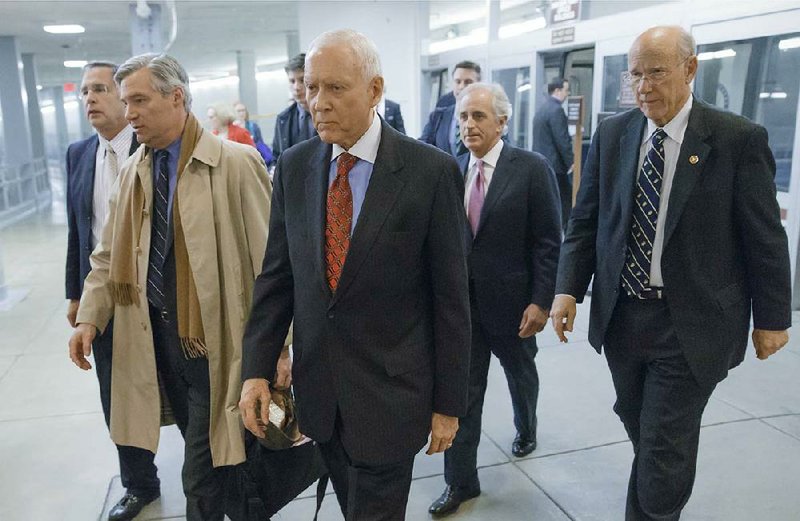WASHINGTON - Congress sent President Barack Obama a $1.1 trillion governmentwide spending bill Thursday, easing the harshest effects of last year’s automatic budget cuts after Tea Party critics chastened by October’s partial shutdown mounted only a faint protest.
RELATED ARTICLE
http://www.arkansas…">Bill will benefit state waterways, lift Delta’s odds
The Senate voted 72-26 for the measure, which cleared the House a little more than 24 hours earlier on a similarly lopsided vote. Both senators from Arkansas voted in favor of the measure.
Obama’s signature on the bill was expected in time to prevent any interruption in government funding Saturday at midnight.
The bill funds every agency of government, pairing increases for NASA and for Army Corps of Engineers construction projects with cuts to the Internal Revenue Service and foreign aid. Regarding Obama’s healthcare law, the bill pays for its implementation, a fight over which sparked Tea Party Republicans to partially shut the government down for 16 days in October.
Also included is funding for tighter regulations on financial markets, but at levels lower than the president wanted.
The compromise-laden legislation reflects the realities of divided power in Washington and a desire by both Democrats and Republicans for an election-year respite after three years of budget wars that had Congress and the White House lurching from crisis to crisis. Both parties looked upon the measure as a way to ease automatic spending cuts that both the Pentagon and domestic agencies had to begin absorbing last year.
All 53 Democrats, two independents and 17 Republicans voted for the bill. Among the 26 Republican votes of no were potential 2016 presidential aspirants Rand Paul of Kentucky and Marco Rubio of Florida.
Shortly before the final vote, Sen. Ted Cruz, R-Texas, accused Senate Democrats of ignoring problems caused by the health-care law. “It is abundantly clear that millions of Americans are being harmed right now by this failed law,” Cruz said.
Unlike last fall, when he spoke for 21 straight hours and helped force the partial government shutdown over defunding the law, this time he clocked in at 17 minutes and simply asked the Senate to unanimously approve an amendment to strip the health-care law’s funding. Democrats easily repelled the maneuver.
Cruz made the case for taking another stand on the issue during a private Republican lunch Thursday, said Senate Minority Whip John Cornyn, R-Texas.
“That’s the amazing thing about the Senate, it just takes one person who thinks it’s a good idea to do it,” Cornyn said.
The 1,582-page bill was really 12 bills wrapped into one in negotiations headed by Rep. Harold Rogers, R-Ky., and Sen. Barbara Mikulski, D-Md., respective chairmen of the House and Senate appropriations committees, and their subcommittee lieutenants. They spent weeks hashing out line-by-line details of a broad, two-year budget accord passed in December, the first since 2009.
Appropriators in the House and Senate worked during the end-of-year holidays to craft the bill, and they announced the agreement Monday. Because current funding had been scheduled to lapse Wednesday, both chambers passed a separate measure pushing the deadline to Saturday.
“In today’s era of shutdown, slowdown, slam-down politics, where negotiating occurs on cable TV rather than in committee rooms, we worked together,” Mikulski said before the vote. “We looked at how we could put together a bill that both sides of the aisle in both houses could agree upon.”
The bill, which cleared the House on a vote of 359-67, increases spending by about$26 billion over fiscal 2013, with most of the increase going to domestic programs. Almost $9 billion in unrequested money for overseas military and diplomatic operations helps ease shortfalls in the Pentagon and foreign-aid budgets.
Lower costs to replace screening equipment allowed for a cut to the Transportation Security Administration. Lawmakers blocked the Agriculture Department from closing six research facilities. And the Environmental Protection Agency is barred from issuing rules on methane emissions from large livestock operations.
Another provision exempts disabled veterans and surviving military spouses from a pension cut enacted last month. House Speaker John Boehner, R-Ohio, signaled that he would oppose a broader drive to repeal the entire pension provision, which saves $6 billion during the coming decade by reducing the annual cost-of-living adjustment for working-age military retirees by 1 percentage point.
The National Institutes of Health’s proposed budget of $29.9 billion falls short of the $31 billion budget it won when Democrats controlled Congress. Democrats did win a $100 million increase, to $600 million, for Transportation Department grants for high-priority infrastructure projects, a program that started with a 2009 economic stimulus bill.
Civilian federal workers would get their first pay increase in four years, a 1 percent cost-of-living increase. Democrats celebrated winning an additional $1 billion over last year for the Head Start early childhood education program and excluding from the bill a host of conservative policy “riders” advanced by the GOP.
Rogers won two provisions backed by the coal industry. One would block the EPA and the Corps of Engineers from working on new rules on “fill material” related to the mountaintop-removal mining. Another would keep the door open for Export-Import Bank financing of coal power plants overseas.
Sen. Mike Lee, R-Utah, a Tea Party favorite, didn’t mention the measure’s funding of the health-care law in a floor speech earlier in the week; instead, he complained at length that the measure dropped funding of a federal program that sends payments to Western states in which much of the land is owned by the federal government and therefore can’t be taxed by local governments.
Information for this article was contributed by Andrew Taylor of The Associated Press and Kathleen Hunter, Derek Wallbank, James Rowley, Richard Rubin and Kasia Klimasinska of Bloomberg News.
Front Section, Pages 1 on 01/17/2014

